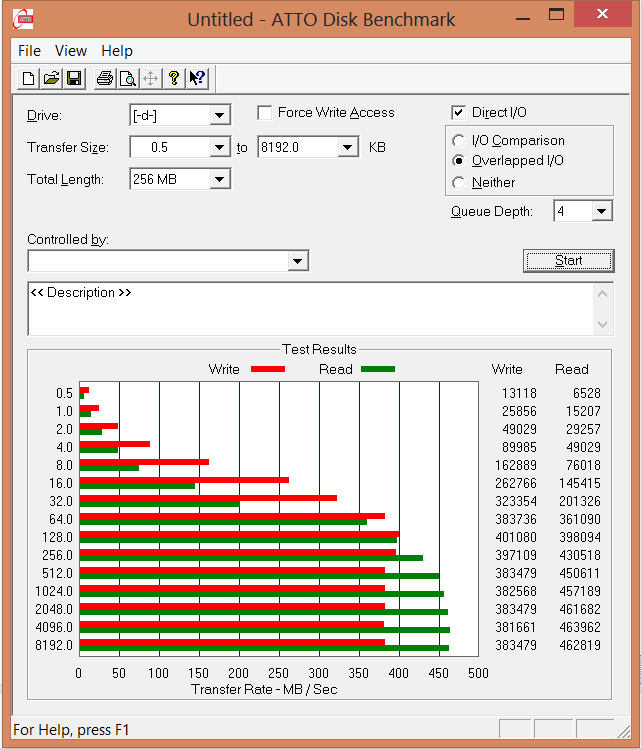GETTING ESATA AND USB 3 PERFORMANCE
The performance shown in our report can be achieved outside our test environment but, it bears mentioning, that certain conditions must be present. To achieve UASP speeds in USB 3.0 for instance, one needs to be using it in a device that contains a USB 3.0 port compliant with UASP. As well, plugging this device into an eSATA port of any motherboard will only get you speeds of just over 300MB/s as every motherboard eSATA port (at least that we know of) is controlled by an ASMedia chip which bottlenecks the performance. To get eSATA performance as we show here, one must use an eSATA adapter that plugs directly into the Intel port.
For our testing today, we will include both USB 3.0 and eSATA performance results.
ATTO Disk Benchmark is perhaps one of the oldest benchmarks going and is definitely the main staple for manufacturer performance specifications. ATTO uses RAW or compressible data and, for our benchmarks, we use a set length of 256mb and test both the read and write performance of various transfer sizes ranging from 0.5 to 8192kb. Manufacturers prefer this method of testing as it deals with raw (compressible) data rather than random (includes incompressible data) which, although more realistic, results in lower performance results.
USB 3.0 (UASP)
Performance highs of 463MB/s and 401MB/s are already great results from any external device. Let’s turn up the volume just a bit with eSATA.
ESATA (INTEL PORT)
A transfer speed high of 533MB/s is the highest we have ever obtained from an external SSD and these results demonstrate that we can come pretty close to true 6Gbps speeds with the right eSATA connection.
CRYSTAL DISK BENCHMARK VER. 3.0 X64
Crystal Disk Benchmark is used to measure read and write performance through sampling of highly compressible data (oFill/1Fill), or random data which is, for the most part, incompressible. We have provided the results of USB 3.0 testing on the left and eSATA on the right:
These performance resulkts are very impressive, however, even more impressive is the low 4K random write tranfer speed of 99MB/s. eSATA definitely rules in this test.
Up until recently, AS SSD was the only benchmark created specifically for SSD testing and it uses incompressible data. AS SSD, for the most part, gives us the ‘worst case scenario’ in SSD transfer speeds because of its use of incompressible data and many enthusiasts like to AS SSD for their needs. Once again, USB 3.0 is shown on the left with eSATA on the right.
THROUGHPUT
IOPS
IOPS are a bit lower than expected but both results are respectable and amongst the best we have seen.
We see an absolute ly incredible difference in file transfer results between USB 3.0 and eSATA. Moving a program file in eSATA was accomplished in 1/5th the time with a transfer speed almost 5 times as fast.
 The SSD Review The Worlds Dedicated SSD Education and Review Resource |
The SSD Review The Worlds Dedicated SSD Education and Review Resource | 


Their website shows an ‘In-drive UPS’ feature for these drives. Is that marketing-speak for supercaps? Would be almost required for an external drive where accidental disconnects may occur.
Sounds very impressive! However how does it stack up against Samsung in terms of reliability?